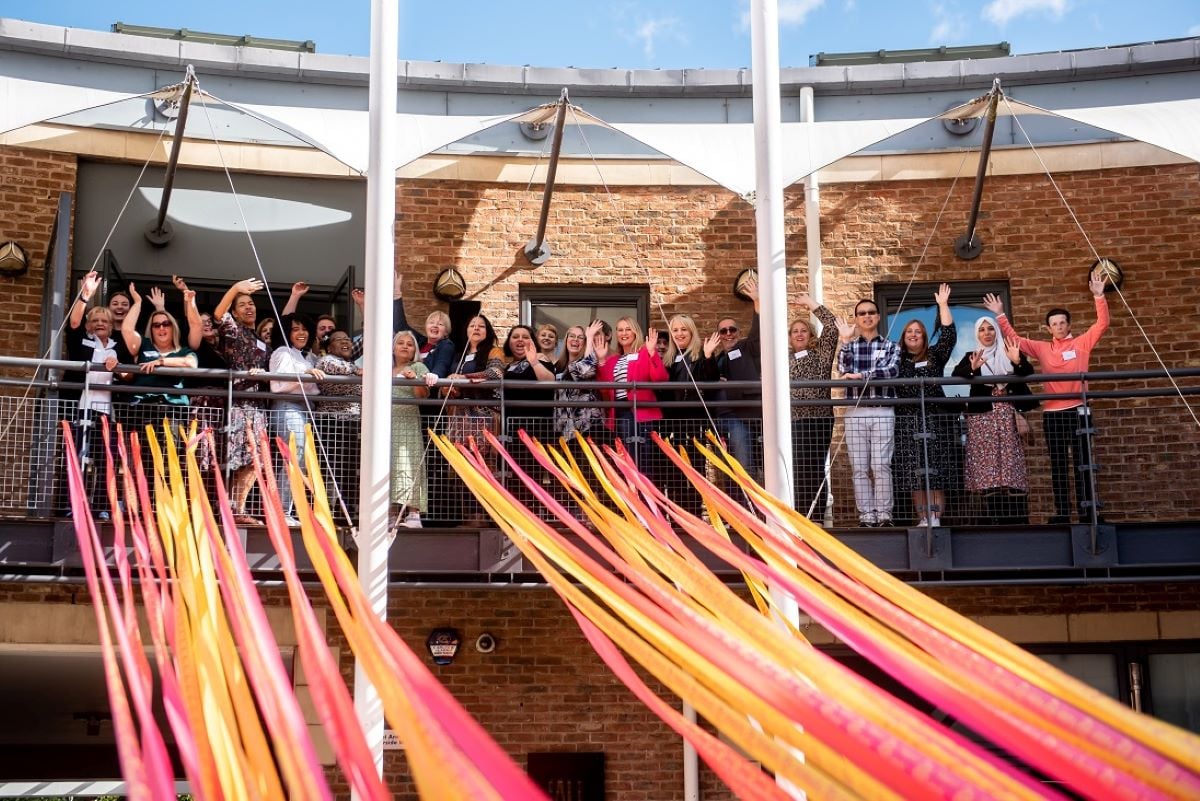
My LEEDS 2023 Neighbourhood Hosts will imagine, shape and create events together with the community
Photo: JMA Photography
Cultural encounters of the empathic kind
Driven by funder requirements and sector expectations, evaluation can feel top-down. Stephen Welsh argues for a more people-centred approach which is empathetic, inclusive and unassuming.
According to scientists, our universe is expanding, a phenomenon that cultural sector award ceremonies appear to share. Each time I turn on social media, there’s an advert encouraging me to nominate people or projects for an array of awards. But what’s causing this expansion?
Is it perhaps the expectation that every cultural project should somehow be ‘out of this world’? This assumption has led to a cultural sector equivalent of the Space Race, where organisations are compelled to compete for accolades, funding and resources, and glowing evaluation is the rocket fuel used to launch them into orbit.
But, by repeatedly aiming for the stars, we risk losing sight of what’s happening on the ground. So how can we prioritise a people-centred rather than a prize-focused approach to cultural impact and evaluation that brings us back down to earth with empathy but no less ambition?
Sparking conversations
Robin Smith at the Centre for Cultural Value (the Centre), warned me not to get excited about the arrival of a podcast microphone, as he’d mailed it to me in some XBox packaging. He was aware that the arrival of what appeared to be a brand new games console might cause a stir; we’d shared our mutual appreciation for gaming while preparing to record an episode of the Centre’s Reflecting Value podcast.
This latest podcast season would focus on how the Centre's co-produced Evaluation Principles could be applied in practice, and the episode I was hosting focused on perhaps one of the trickier to nail down concepts: empathy.
In between contemplating the merits of Zelda and Grand Theft Auto, we pulled together a guest list of people-centred practitioners from across the UK, including sonic artist and researcher Alex De Little, freelance creative, coach and writer Morvern Cunningham, and co-directors of Rising Arts Agency Euella Jackson and Jess Bunyan.
I knew Morvern might be interested in the podcast because, alongside Tiki Muir, Community Development Lead at WHALE Arts Agency, they had co-facilitated the Creative Community Hubs project in 2021 – 2022. The project examined partnership working between creative community hubs and cultural institutions in Edinburgh with the aim of helping to ‘contribute to better and more equal partnership working in the future’.
Findings from the project included how creative community hubs’ people-centred approach resulted in them becoming a key source of knowledge and community connections. Yet, cultural institutions often disregarded the value of their way of working and their expertise, leading to unequal and ‘dysfunctional partnerships’. To delve deeper, I had met with Tiki in 2022 over a coffee, and it was clear we shared a common cause; we both envisioned a cultural sector able to accept flexible metrics of success, confront power imbalances and learn from failure, all of which necessitate empathy.
Deepening connections
In between these conversations, I continued working for clients such as Manchester’s Ahmed Iqbal Ullah RACE Centre and Education Trust. I'd been collaborating with Dr Safina Islam and Maya Sharma, the Centre and Trust’s Head and Collections Engagement Officer, respectively, to consider how best to evaluate the impact of their work.
As an organisation that specialises in anti-racist and community-led practice, there was no need for me to emphasise the importance of empathy. Rather, their continual efforts to tackle exploitative and extractive modes of cultural engagement and evaluation inspired me.
Unsurprisingly, their research into equity, diversity and inclusion in the heritage sector across England discovered that some participants felt ‘exploited by heritage institutions who engaged with them sporadically and did not appear interested in meaningful or sustained relationships’. Their report underlined the problems caused by performative gestures rather than real connection.
Recording the podcast, I was pleased to have the opportunity to build more of my own connected relationships. I also had the chance to delve into the rich textures of people’s experiences integrating empathy throughout their cultural practice.
For example, during our chat, Alex De Little taught me about deep hanging out, a relational research methodology aimed at co-creating cultural value that he is using to carry out a longitudinal evaluation of the My Leeds 2023 Neighbourhood Hosts programme.
This struck a chord with me and my practice since it involved hearing and amplifying voices that are repeatedly marginalised.
Prioritising empathy
Empathy is only possible when we take the time to genuinely get to know one another, but once it’s established, it can have a profoundly positive impact on participants, partnerships, practitioners, projects and, of course, evaluation. The alternative is making assumptions and being too preoccupied with stargazing rather than outcomes that are truly meaningful to the people involved.
So, whether you bond over a coffee or games console, being empathetic, people-centred and relational is an essential part of building a more equitable cultural sector. Winning awards is great, but taking the time to get to know people is even better.
The Centre’s new Reflecting Value podcast is out now. Listen to the latest episode about empathy.
Stephen Welsh is a freelance curator, consultant and cultural practitioner.
![]() www.culturalvalue.org.uk | www.stxwelsh.com/
www.culturalvalue.org.uk | www.stxwelsh.com/
![]() @valuingculture | @stxwelsh
@valuingculture | @stxwelsh
This article, sponsored and contributed by the Centre for Cultural Value, is part of a series supporting an evidence-based approach to examining the impacts of arts, culture and heritage on people and society.
Join the Discussion
You must be logged in to post a comment.